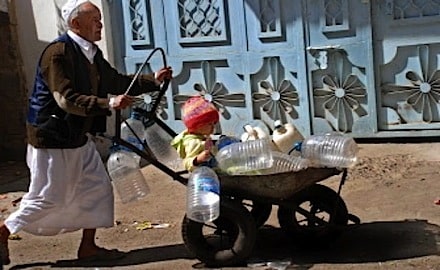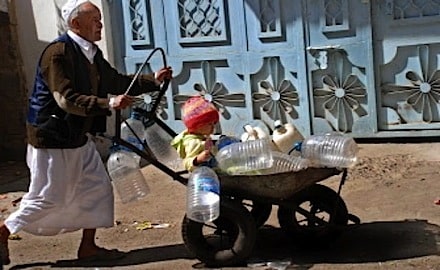In the midst of a war-fueled water crisis, the Saudi Arabia-led coalition reportedly bombed a water bottling plant in northern Yemen on Sunday, adding to mounting civilian casualties as the military onslaught enters its sixth month.
“The corpses of 36 workers, many of them burnt or in pieces, were pulled out after an air strike hit the plant this morning,” resident Issa Ahmed told Reuters of Sunday’s bombing in the province of Hajjah.
The Yemeni Defense Ministry put the number of civilians killed at 34, with dozens wounded.
Coalition spokesperson Brigadier General Ahmed Asseri denied that the bombing hit a civilian target. However, this claim contradicts reports by residents and medical officials.
The apparent bombing follows a series of attacks targeting civilian infrastructure and neighborhoods. Coalition strikes killed 65 people in Taiz late last week, the vast majority of them civilians. Furthermore, the bombing of a milk factory in the Red Sea port city of Hodeida in July killed 65 people.
In a report released earlier this month, humanitarian aid agency Amnesty International criticized the coalition’s “pattern of strikes targeting heavily populated areas including civilian homes, a school, a market and a mosque. In the majority of cases no military target could be located nearby.”
The organization reported that a July 9 attack killed “10 members of one family including four children who had sought shelter at a school in north Aden after being displaced from their home because of fighting.”
Since March 26, the Saudi-led bombing campaign has also struck markets, schools, medical facilities, power plants, refugee camps, and warehouses storing humanitarian aid. Over 4,300 people have been killed in the conflict, according to the United Nations. Meanwhile, Saudi ground forces have reportedly entered Yemen for the first time since the conflict began.
The Saudi-led military coalition includes the United Arab Emirates, Bahrain, Egypt, Jordan, Kuwait, Morocco, Qatar, and Sudan. While the United States and United Kingdom both say they are not formally part of the coalition, they are both providing direct assistance—including logistics and intelligence—as well as serving as major weapons suppliers for the campaign.
The ongoing fighting, decimation of civilian infrastructure, and Saudi-led naval blockade, is driving a food and water crisis. The World Food Program warned earlier this month that roughly 13 million people in Yemen are food insecure, including 6 million—or one in five people—whoare in “urgent need of external assistance.” Meanwhile, water has reached critical shortages, with prices in Sana’a tripling since the start of the conflict.
“Right now, the conflict-driven convergence between the lack of staple food, access to clean water, and a diminished fuel supply create the dawn of a perfect storm for the most vulnerable Yemeni people,” said Ertharin Cousin, WFP Executive Director.
People from within Yemen and the diaspora have turned to social media to document the impacts of the military assault. The independent online campaign Kefaya War, or “enough war” in Arabic, continues to call for a cessation of hostilities.
Reprinted with permission from CommonDreams.org.


